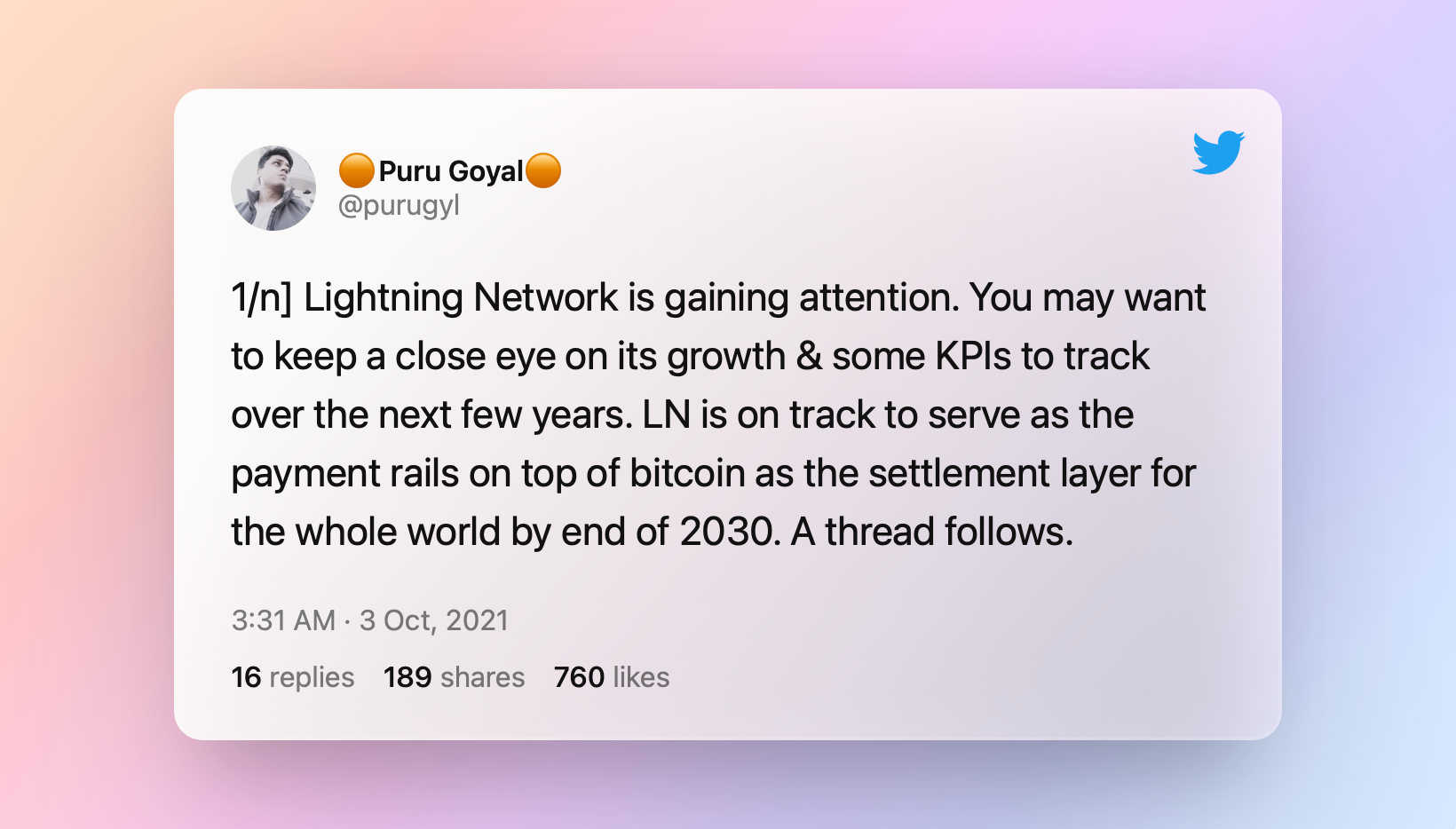There are a few things I'm really interested in lately. I don't have much time to wander in my curiousity, but if I did, I'd go deeper on:
- DAOs
- Lightning
- Future of Work / Education
Notice, I don't have NFTs on that list. I think they're cool, interesting, and represent the future... I'm just not that interested at the moment.
It's Lightning in particular that I want to share quickly, to break my non-writing streak, and try to get through some of this writers block / brain freeze I'm struggling with.
What is Lightning?
Lightning is a way to get more, faster transactions on the bitcoin network while lowering payment fees. It enables small digital payments in a realistic way. Bitcoin can do this without Lightning, but fees are too high and the network is "too slow".
I found this bit from Bitcoin.com as a good way to explain what problems Lightning is meant to address:
Bitcoin’s current theoretical maximum transactions per second (TPS) is 10, though in reality it is between 3 and 7. Contrast this with traditional payment processors like VISA, which handled on average 6,000 TPS in 2020 (based on VISA’s claim of 188 billion transactions a year).
Bitcoin’s transaction fees can vary wildly depending on the current demand to use the network. For instance, on April 20th 2021 average transaction fees were in excess of $50, while on August 9th 2021, the average was around $2.50. For large transactions, such as bank transfers or international remittance, Bitcoin’s speed and cost is comparable or superior to alternatives. But if Bitcoin is to be used for everyday payments (so-called micro-transactions, e.g., a cup of coffee, gas), the transaction speed must increase and transaction costs must decrease drastically.
Recently, Lightning has been used by El Salvador and Twitter for large scale payment solutions. This was something missing – real-world proof-points for "normal" use cases.
Why Lightning?
It's fast. Look at an established payment processor (like VISA above) and it's easy to see that any new payment network needs to be have a baseline of scalability to be considered as alternatives to existing solutions.
It's decentralized. I'm not sure "decentralized" is a feature that many consider as important, but it's worth mentioning. We trust VISA and Mastercard. How can we trust Lightning? Well, it's fully decentralized and to me that means resilient. It's designed to be scalable, reliable, etc... and as a user (merchant, consumer) you don't need a name brand in order to feel safe using the network. The things that make us feel safe sending money (in Enterprise Software we'd call these the '-ilities' – scalability, reliability, etc) are built in programmatically to the infrastructure. So that's why I decided to mention the decentralized "feature".
Low fees. Here's the thing. A lot of conversations I see about payments talk around the issue of merchant fees for the networks. As the rules have changed, we've started to see different prices for cash vs credit card (or minimum purchase amounts to be able to use a card), because merchants aren't as willing to eat the payment processing fees as they have been forced to in the past. Look at Lightning fees as compared to credit card processing fees and you can see why merchants will be motivated to use the Lightning payment infrastucture.
Here's a great thread on Lightning and the key performance metrics useful to understanding Lightning's "whys":

What Next?
I think some of this is behavioral. In truth, not many are able/willing to pay with Lightning. Merchants and small business owners have other priorities at this point, because the immediacy of the payback is not there.
Smart merchants may jump on the bitcoin bandwagon to their marketing advantage – there were some bitcoin conferences in NYC over the last couple of weeks. A restaurant or car service that accepted Lightning would have gotten a lot of free press, for whatever that's worth.
Twitter acceptance is going to make this more mainstream. Why not get ahead of acceptance to save Visa/Mastercard fees? It's definitely coming.
Two big bits of news and one interesting use case:
- Verifone Point of Sale systems to accept bitcoin. Though, this isn't lightning (at the moment) and seems disorganized. But, they're starting and will learn. Look at ApplePay. At first, it was anemic. As time goes on, we don't even notice it.
- Strike has a Lightning Payments API, and Twitter will be using it. This is going to be interesting because Payments APIs are widely adopted. Anyone using a Payment API has hopefully abstracted the API from their internal systems, which means incorporating the Strike API should be easy, and have little- to no-impact on developers using the Payments API.
- Streaming payments for creators. Here's a podcast player that enables lightning payments to be integrated into the listening experience to reward creators for their work. It's so early, but we're going to see things like this redefine how people get paid – digitally, in small amounts, and globally distributed... without interference from blood-sucking intermediaries.
More:


